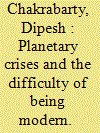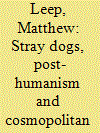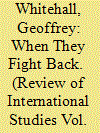|
|
|
Sort Order |
|
|
|
Items / Page
|
|
|
|
|
|
|
| Srl | Item |
| 1 |
ID:
159790


|
|
|
|
|
| Summary/Abstract |
This article questions whether the presently dominant ideas about globalisation and global warming work with very different conceptions of the ‘globe’ that are both connected and yet opposed to each other. The discussion on globalisation may be seen as an extension of homocentric narratives of modernity that see humans as separate from the natural world. The global warming literature, on the other hand, has led to a serious renewal of critical calls to abandon the nature/culture distinction. This article tracks some of the ethical difficulties of being modern at a time when collective human aspirations carry planetary implications. In the process, the article brings into conversation some post-human and post-colonial perspectives on our time.
|
|
|
|
|
|
|
|
|
|
|
|
|
|
|
|
| 2 |
ID:
161629


|
|
|
|
|
| Summary/Abstract |
International Relations scholars have recently begun exploring the politics of human-animal relations in global affairs. Building on Jacques Derrida’s work on hospitality and animals, this article theorises possibilities of responsibility to animals in war zones, pushing the limits of what it means to be with and for others regardless of their human or animal otherness. Specifically, I develop a critical account of cosmopolitan belongingness to illustrate how our being on earth is always a ‘being-with’ animal others. In thinking through possibilities of post-human belongingness that could emerge in times of war, cosmopolitanism becomes a futural task, an out-of-time and endless confrontation of past and future opportunities for interspecies togetherness. The theoretical significance of this approach is illustrated with a case study on the killing of stray dogs during the Iraq War. This case reveals a cosmopolitanism calibrated to more fully consider possibilities of human-animal belongingness amidst violence.
|
|
|
|
|
|
|
|
|
|
|
|
|
|
|
|
| 3 |
ID:
193309


|
|
|
|
|
| Summary/Abstract |
Since humanity is no longer the epistemological, ontological, or moral measure of all things, then (how) should international political theorists rethink animal politics? The archive ‘When They Fight Back’ records incidences of when animals ‘fought back’. It explores ways of conceptualising resistance and the implications of broadening the concept to include non-human actors via three findings: (1) Animal conflicts are everywhere and classifying them as revolt, reaction, and resistance is a creative exercise that encourages reflections about interspecies relations; (2) Most animal/human conflicts are not treated as ‘conflicts’. Instead, they are normalised within a biopolitical discourse that seeks to reduce resistance (characterised as Animal living) in order to promote living (characterised as Human resistance). (3) If excluded, animal resistance finds its way back into literatures via ethical-aesthetic figurations, traces, and desires ‘for’ the Animal. As such, the archive stages a Clausewitzian case of escalation from resistances into total war. In open hostility towards a perceived enemy, animals fight back – and because they fight back, humanism has built its own form of resistance (i.e., politics, ethics, aesthetics, biopolitics, international relations, etc.). I conclude that Human Being (as a form of resistance) must be surrendered if the war on life itself is to end.
|
|
|
|
|
|
|
|
|
|
|
|
|
|
|
|
|
|
|
|
|